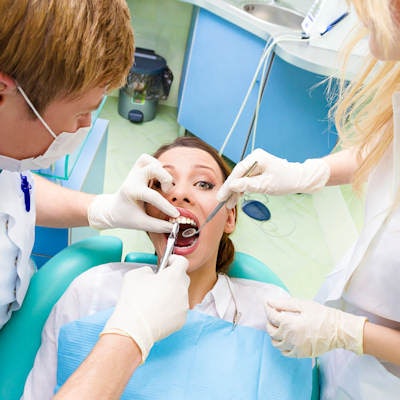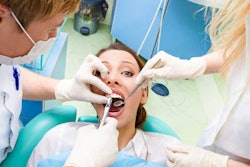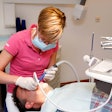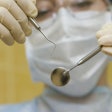
For hygienists, there's never enough time, including time to give dietary advice to patients. Although hygienists and dental therapists value the importance of nutrition counseling, they believe time is the No. 1 barrier to providing advice at the dental office, a new study has found.
Researchers sent a survey to hundreds of Australian hygienists and midlevel providers to see if the dental professionals valued counseling patients about diet and if there were any barriers that stopped them from doing so.
"The results suggest that whilst many dental hygienists and oral health therapists have positive beliefs regarding the importance of dietary counseling, there is a multitude of barriers preventing the delivery of dietary advice," wrote the study authors, led by Melanie Hayes, PhD, from the Melbourne Dental School (International Journal of Dental Hygiene, November, Vol. 14:4, pp. 255-260). "This knowledge may allow us to create strategies to overcome these barriers and improve the delivery rate of dietary advice."
Problems with time and patient compliance
While it is known that a poor diet contributes to both dental and systemic diseases, many health professionals do not provide dietary advice on a regular basis. So the researchers wondered what barriers might be preventing hygienists and dental therapists in Australia from providing nutrition information to patients.
“Lack of appointment time may be due to the notion that 'time is money,' where time equals production dollars for the employers.”
"Dietary advice provided by health professionals has the potential to influence patients' eating habits," the authors wrote. "Therefore, the aim of this study was to assess current attitudes and practice behaviors of dental hygienists and oral health therapists within New South Wales, Australia, and investigate the perceived barriers to providing dietary advice."
The researchers sent a survey to Australian dental hygienists who were registered with the New South Wales branch of the Dental Hygienists Association of Australia and also oral health therapists who were registered with the Oral Health Therapists Association. These therapists are midlevel providers who perform dental hygiene services and diagnose and treat caries in children and young adults.
The survey used a five-point scale that allowed respondents to fill in how much they agreed with a statement, from strongly agree to strongly disagree. The hygienists and therapists were asked about topics related to nutrition education, such as resources they use, their knowledge base, and potential barriers.
More than 400 hygienists and therapists responded to the survey. The respondents were close to the Australian national average in both age (35) and gender (87% female).
The researchers found that dietary advice in the dental office is important to hygienists and therapists, but barriers exist to providing such counseling. The most cited barrier was a lack of time, with 76% of respondents saying they agreed or strongly agreed that time is a barrier to the provision of dental advice.
| Attitudes and perceived barriers to providing dietary advice | |||
| Attitudes and barriers | Disagree or strongly disagree | Neutral | Agree or strongly agree |
| I have the knowledge to provide dietary counseling. | 6.3% | 19% | 75.7% |
| Dietary counseling is one of the hygienist's/therapist's responsibilities. | 0.9% | 6.8% | 92.3% |
| Dietary counseling in the dental setting is effective. | 0.9% | 22.8% | 76.3% |
| Time is a barrier to the provision of dental advice. | 8.9% | 16.0% | 75.1% |
| Patient compliance is a barrier to the provision of dental advice. | 7.3% | 17.8% | 74.9% |
"Lack of appointment time may be due to the notion that 'time is money,' where time equals production dollars for the employers, and, thus, shorter appointment times are favorable as it equivalents to more patients being seen," the authors wrote.
An almost equal number of hygienists and therapists felt that patient compliance also was a barrier to providing dietary advice. This may be because dental professionals are not sufficiently taught about behavioral science, the authors noted.
"It has been suggested that whilst healthcare providers play a vital role in assisting patients' healthy behavior changes, a lack of understanding how behavior change can often result in patient noncompliance," they wrote. "Understanding a person's readiness to change could improve the way in which oral hygiene inventions and advice are given in the clinical setting and increase patient compliance."
Building on existing strategies
The study had a number of shortcomings, including that it was focused on Australian dental professionals, so its findings may not be applicable to other populations. It also relied on self-reporting from hygienists and therapists, which could be problematic for a number of reasons, including a potential to overreport the frequency of dietary counseling or getting more responses back from professionals who are interested in diet and nutrition.
In the future, the researchers hope studies investigate methods to help alleviate some of the barriers to providing dietary advice. They specifically noted future research could look at increasing the availability of seminars and courses that address nutritional counseling.
"Future investigations into time-efficient dietary advice strategies that can be implemented for time-poor dental professionals are needed to help overcome this barrier and increase the delivery rate of dietary advice," the authors wrote.


















